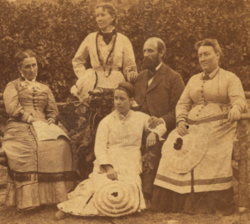Angus M. Cannon

Angus Munn Cannon (May 17, 1834 – June 7, 1915) was an early
Early life
Cannon was born in
In 1842, the Cannon family went to Nauvoo, Illinois, United States. By 1849, they were in Utah Territory. Cannon was the younger brother of George Q. Cannon and their lives followed very similar paths up until their arrival in Utah.
Church service
In 1854, Cannon went on a mission for the Church of Jesus Christ of Latter-day Saints (LDS Church) to the Eastern United States, where he assisted John Taylor in publishing a periodical entitled The Mormon. He also preached and baptized in Connecticut, New Jersey, Pennsylvania and Delaware.[2] Cannon returned to Utah Territory due to the troubles connected with the Utah War.
In 1864, Cannon helped establish Call's Landing on the Colorado River, later known as Callville, Nevada. Callville was submerged when Lake Mead was filled.
In 1869 and 1870, Cannon served a second mission in the Eastern United States.
Politics
Cannon was the mayor of
Polygamy prosecution
| Mormonism and polygamy |
|---|
 |
|
Latter Day Saints portal |
Like many early members of the LDS Church, Cannon practiced
Cannon was pardoned in 1894 by U.S. President Grover Cleveland.[7]
Death
Cannon died of "
See also
References
- ^ Cannon, Donald Q., "Angus M. Cannon: Pioneer, President, Patriarch" in Cannon, Donald Q. and David J. Whittaker, ed., Supporting Saints: Life-Stories of 19th Century Mormons. (Salt Lake City: Bookcraft, 1985) p. 370
- ^ Cannon. Supporting Saints. p. 371
- ^ Cannon. Supporting Saints. p. 372
- ^ Cannon. Supporting Saints. p. 372, 386
- ^ a b c 116 U.S. 55 (1885).
- ^ "The Anti-Polygamy Law; Ex-Delegate Cannon's Sentence Affirmed. The Supreme Court Upholds the Decisions of the Territorial Judges; Opinions in Other Cases", The New York Times, December 15, 1885.
- ^ "Archived copy". Archived from the original on October 8, 2018. Retrieved November 24, 2014.
{{cite web}}: CS1 maint: archived copy as title (link) - ^ State of Utah Death Certificate Archived July 18, 2011, at the Wayback Machine
Further reading
- ISBN 0-88494-565-0.
External links
- Angus M. Cannon diaries and letter, MSS SC 199 at L. Tom Perry Special Collections, Harold B. Lee Library, Brigham Young University

